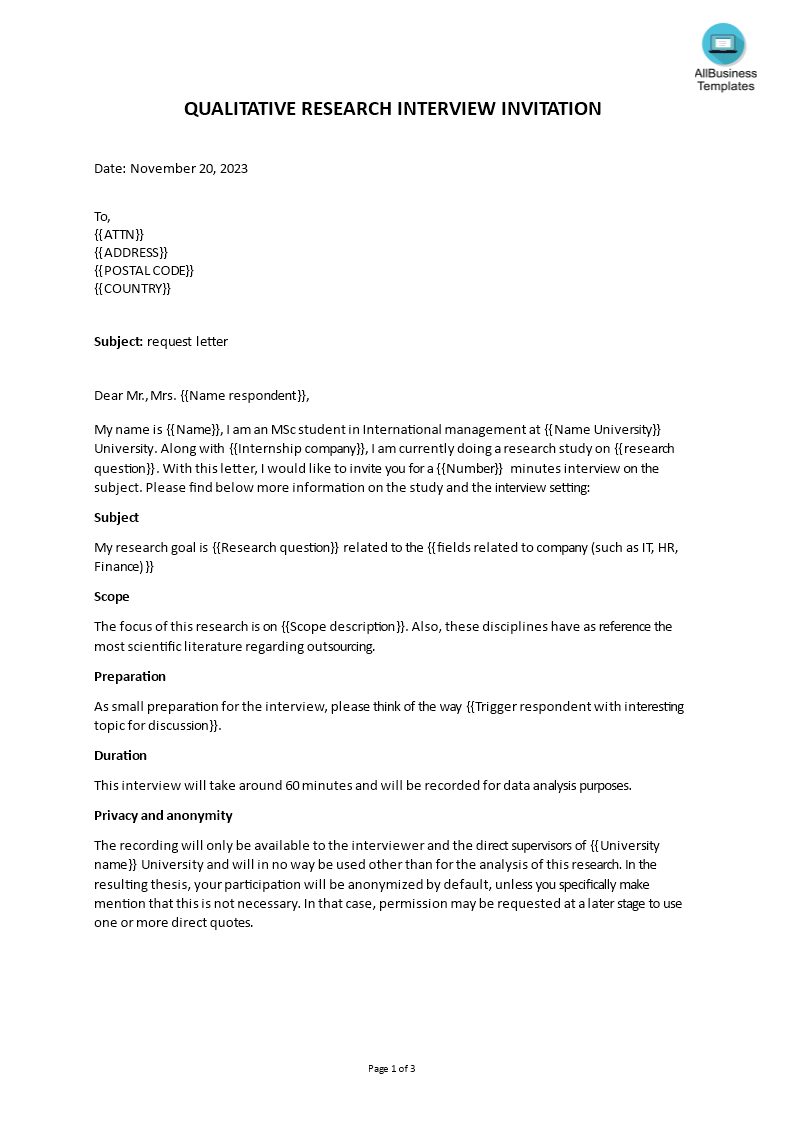Interview request Qualitative Research
Save, fill-In The Blanks, Print, Done!

Download Interview request Qualitative Research
Microsoft Word (.docx)Or select the format you want and we convert it for you for free:
- This Document Has Been Certified by a Professional
- 100% customizable
- This is a digital download (64.37 kB)
- Language: English
- We recommend downloading this file onto your computer.
How to make an Interview request letter for your Qualitative Research study? What does interview protocol mean in qualitative research? Our qualitative research request template is designed to help you quickly and easily create interview requests that are tailored to your research needs. It includes all the necessary fields and questions needed to get the information you need. Get your Qualitative Research Interview Request here!
An interview request in the context of qualitative research refers to a formal communication sent by a researcher to potential participants, inviting them to take part in an interview for the purpose of collecting in-depth information and insights. Qualitative research is a methodological approach that aims to understand and interpret the experiences, perspectives, and meanings that individuals attribute to a particular phenomenon.
Here's a breakdown of what an interview request in qualitative research entails:
- Purpose of the Request:
- The request serves to inform potential participants about the researcher's interest in their experiences, opinions, or perspectives on a specific topic.
- Recruitment for Data Collection:
- Researchers use interview requests to recruit individuals who fit the criteria for their study and have the relevant experiences or perspectives the researcher is interested in exploring.
- Informed Consent:
- The request typically includes information about the nature of the study, the purpose of the interview, and details regarding informed consent. Participants are informed that their involvement is voluntary, and they have the right to withdraw at any time.
- Description of the Research:
- The request briefly outlines the broader context of the research and explains why the potential participant's input is valuable for the study.
- Logistical Information:
- Details about the logistics of the interview are provided, including the format (e.g., one-on-one, focus group), the expected duration, and whether the interview will take place in person, over the phone, or through video conferencing.
- Contact Information:
- Researchers include their contact information so that potential participants can reach out with any questions or concerns they may have.
- Ethical Considerations:
- The request may touch upon ethical considerations, such as how confidentiality will be maintained and how the data will be used.
- Gratitude and Acknowledgment:
- Expressions of gratitude are often included, acknowledging the potential participant's contribution and emphasizing the importance of their involvement.
- Follow-up Information:
- If the potential participant agrees to participate, the request may include instructions for scheduling the interview or provide further details about the next steps in the research process.
In qualitative research, interviews are a primary method for gathering rich and nuanced data directly from individuals. Crafting an effective interview request is essential for encouraging participation and establishing a collaborative and ethical relationship between the researcher and the participant. Researchers must adhere to ethical guidelines and ensure that participants are well-informed about the study before consenting to participate.
Download our Interview request Qualitative Research template now and make it part of your professional toolkit. Customize it with your own questions and examples, and use it to quickly create interview requests. Start collecting valuable data today.
DISCLAIMER
Nothing on this site shall be considered legal advice and no attorney-client relationship is established.
Leave a Reply. If you have any questions or remarks, feel free to post them below.
Research Templates
We provide a professional fundamental and applied research template collection. Check out and download the most suitable sample research templates in Word or PDF!
Read moreRelated templates
Latest templates
Latest topics
- Excel Templates
Where do I find templates for Excel? How do I create a template in Excel? Check these editable and printable Excel Templates and download them directly! - GDPR Compliance Templates
What do you need to become GDPR compliant? Are you looking for useful GDPR document templates to make you compliant? All these compliance documents will be available to download instantly... - Google Docs Templates
How to create documents in Google Docs? We provide Google Docs compatible template and these are the reasons why it's useful to work with Google Docs... - IT Security Standards Kit
What are IT Security Standards? Check out our collection of this newly updated IT Security Kit Standard templates, including policies, controls, processes, checklists, procedures and other documents. - Letter Format
How to format a letter? Here is a brief overview of common letter formats and templates in USA and UK and get inspirited immediately!
cheese

